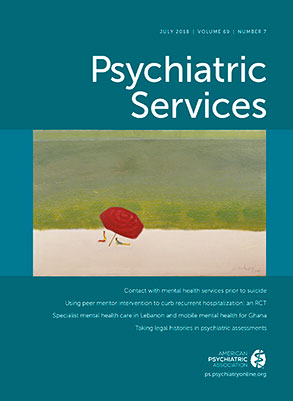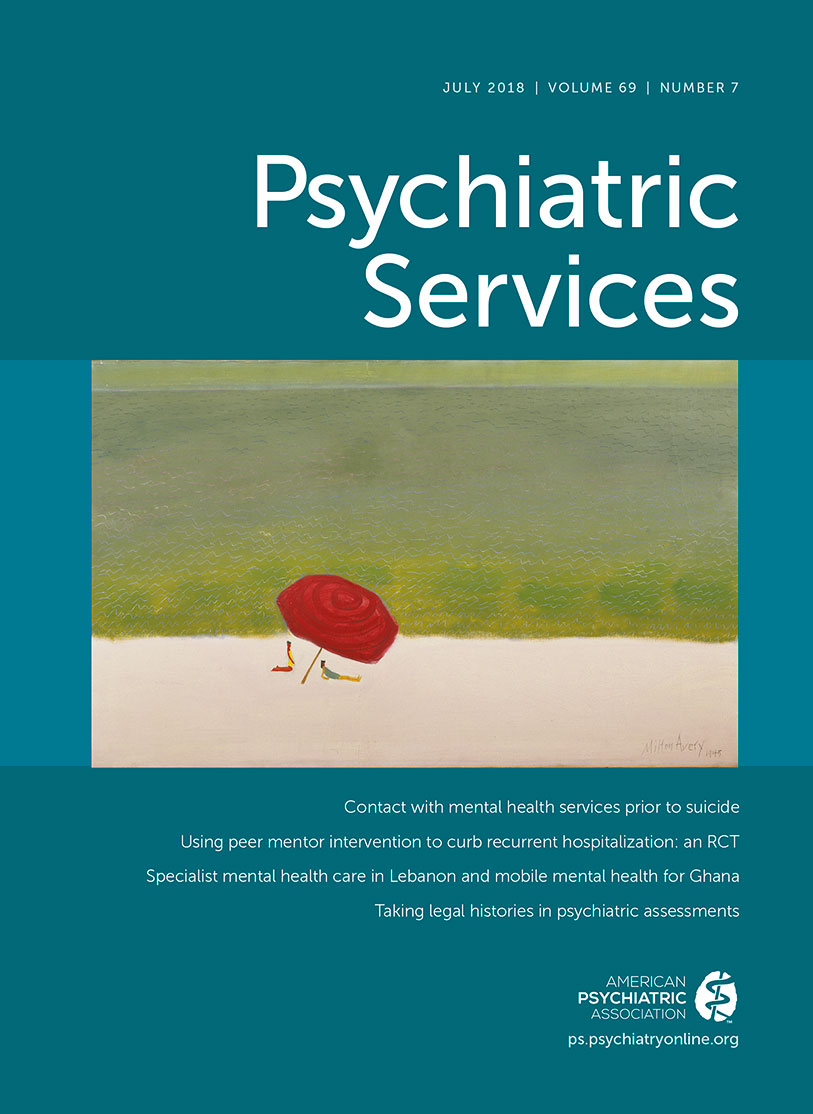The American legal system shapes the lives of many people living with mental illness in this country. Researchers have estimated that at least 10%–25% of inmates in U.S. jails and prisons have some form of mental illness (
1,
2). Jails and prisons are now believed to house approximately 10 times as many people with serious mental illness as all remaining state mental hospitals (
2). Studies suggest that one in four people with mental illness has a history of police arrest (
3) and that inmates often have higher rates of mental health issues than the general population (
4,
5). These associations are not limited to adults; youths in the juvenile justice system also appear to have high rates of mental illness (
6).
Patients who present for psychiatric evaluation may have legal histories that are pertinent to their care. How frequently clinicians assess patients’ legal histories remains poorly studied, but evidence suggests that many mental health professionals avoid forensic issues in clinical practice. There are marked shortages of mental health professionals in correctional settings (
7), and trainees often do not participate in clinical rotations at correctional facilities (
8–
10). A survey of psychology graduate students published in 2007 found that over 30% did not “want forensic/correctional training” (
10). A 2012 survey of Texas psychiatry residents found trainees harbored more negative attitudes toward inmates compared with other patients and would rather not work in correctional settings (
8).
Mental health professionals may not always learn about the importance of evaluating patients’ legal histories. For example, while the Accreditation Council for Graduate Medical Education requires that psychiatry residents demonstrate knowledge in the “legal aspects of psychiatric practice” (
11), residents are not required to demonstrate competency in taking a patient’s legal history before becoming practicing psychiatrists. Guides to psychiatric assessments frequently omit or give cursory attention to the role of legal history in the clinical evaluation. Trainees may assume that they should ask about legal history only with certain patients (e.g., those with past violence or antisocial traits).
Still, the mass incarceration of Americans with mental illness demands that mental health professionals pay attention to patients’ legal histories. This column reviews why mental health professionals should assess patients’ legal histories and how to approach this potentially sensitive subject with patients.
Relevance to Psychiatric Assessments
Legal history can influence psychiatric treatment decisions. The nature of a patient’s legal history (e.g., a remote traffic infraction versus recurrent incarceration for violent crimes) can help to refine diagnostic impressions. Patients may have encountered psychotherapy, psychotropic medications, or other elements of psychiatric care in correctional settings, which can shape patients’ attitudes toward such services. Major developments in a patient’s psychiatric history, such as first-episode psychosis or self-harm, may have occurred during incarceration. Beyond the criminal justice system, many patients face civil cases or legal aspects of mental health care, such as involuntary hospitalization or conservatorship, knowledge of which may inform clinical decision making.
Taking a legal history can help mental health professionals fulfill two of their most vital functions—assessing suicide risk and violence risk. Incarceration can place individuals at high risk of suicide (
12), and patients may have harmed themselves or attempted suicide under custody in the past. Similarly, prior legal history, including convictions for violent crimes, restraining orders, and weapons-related charges, can be key in assessing a patient’s propensity for violence. Ongoing legal issues can be psychosocial stressors that elevate a patient’s risk of suicide or violence. Ignoring a patient’s legal history may lead clinicians to formulate grossly inaccurate clinical assessments of patients’ dangerousness to themselves or others.
Patients with legal histories may suffer from worse health outcomes compared with those without prior legal troubles (
13,
14). People with histories of incarceration are particularly vulnerable from a medical standpoint, including being at risk of infectious diseases, substance abuse, psychological trauma, poor diet, limited access to medical care, homelessness, and disruptions in treatment (
13,
14). By talking about legal history, mental health professionals might better identify such health-related disparities and provide more effective care to patients.
Incorporating legal history into psychiatric assessments may also combat stigma against patients with current or prior legal issues. One physician recently wrote about his prejudices against an inmate transferred to his care (
15):
“Ugh,” I muttered in quiet annoyance. In my experience, these patients never fared well. Moreover, my cynical side suspected that more wasteful use of limited health care resources was on the horizon. Perhaps I would have felt differently if the patient were not a prisoner; I have no doubt a large part of my reaction was that part of me assumed that anyone who winds up in prison probably is a “bad person.”
Patients with histories of both psychiatric and legal issues are at risk of multiple layers of stigmatization (
16), which may lead clinicians to avoid them or to provide substandard care. Yet ignorance is often the root of stigma. By regularly asking patients about legal history in a nonstigmatizing and compassionate manner, mental health professionals can foster more widespread understanding and acceptance of a historically marginalized patient population.
Initial Approach
How to approach a patient’s legal history during a psychiatric assessment depends on the circumstances of the clinical encounter. Mental health professionals see patients in various health care settings—from emergency departments, to outpatient clinics, to jails—each of which requires a tailored approach to patients’ legal histories. Still, the heterogeneity of clinical encounters does not preclude consideration of common practices.
Psychiatrists and other clinicians should remain mindful that legal history can be a highly sensitive and potentially stigmatizing topic for patients to discuss. Approaching the topic in a routine manner, such as by saying “I ask all of my patients about any past legal history,” may help ease patients’ concerns about discussing the topic. Avoiding stigmatizing language (e.g., “Have you ever committed a crime?”) can facilitate open and empathic conversations about these issues.
Patients might worry about the consequences of discussing legal history with clinicians. These fears may be reasonable given that medical records can be discoverable during legal proceedings. Depending on the clinical scenario, clinicians should consider informing patients about these risks when discussing legal history. It can be helpful to remind patients that the goal of the psychiatric assessment is not to incriminate them but rather to evaluate them from a medical standpoint.
Taking a patient’s legal history requires some familiarity with the language of the American legal system. Depending on their experiences, clinicians develop varying degrees of expertise with the legal system. However, every mental health professional would benefit from developing a basic understanding of the legal system, as well as pertinent terms (e.g., arrest, bail, plea bargain, jail, and prison) that may come up when discussing legal history.
Screening Questions to Consider
Have you ever been arrested?
This brief screening question is broad enough to apply to many patients who may have legal histories but also focused enough to obtain clinically useful answers. The question is relatively simple to understand and may elicit valuable responses even from intoxicated or cognitively impaired patients. Interviewers can tailor the remainder of the legal history, including questions about reasons for the arrests and their consequences, including conviction and incarceration, depending on responses to this question.
Are you currently dealing with any legal issues, such as pending charges or court dates?
This question can also serve as a useful screen for legal history. Its emphasis on active legal issues can provide insights into the patient’s recent behavior and can inform clinicians about ongoing legal proceedings that may require attention during a patient’s care. The wording of the question, including “legal issues” and “court dates,” can apply not only to criminal charges but also to civil cases, such as divorce or conservatorship proceedings.
Other questions.
These suggestions provide only a framework; taking an appropriate legal history requires modifying interview content to each clinical scenario. Forensic mental health professionals who assess inmates may inquire further about issues such as competency proceedings. For patients with histories of violence, interviewers may ask about details including restraining orders or weapons charges. For a geriatric or psychotic patient, clinicians might ask whether a court has ever appointed someone to make treatment decisions for the patient. Patients with substance use disorders may have prior offenses, such as driving under the influence, that inform treatment decisions.
Collateral Information
Collateral information can be essential when evaluating a patient’s legal history. Many psychiatric patients are unable to participate in clinically meaningful interviews as a result of sedation, head injuries, agitation, or other factors. Some patients provide misleading information about their legal histories, whether intentionally or not. Third-party sources of information, including family, friends, and medical records, can give insights about legal history that clinicians might otherwise be unable to gather from interviews.
This topic can be sensitive for patients, so clinicians should use clinical judgment when determining whether and how to gather collateral information about legal history (
17). Requesting a patient’s permission to discuss legal history with third parties, including family or friends, may be one approach. Public databases, such as sex offender registries and prescription drug–monitoring programs, can clarify aspects of patients’ legal histories. When minimal patient information is available, some mental health professionals resort to searching online for collateral information, although such activities raise ethical questions about boundaries in clinician-patient relationships (
18).
Documentation
Clinicians may worry that documenting legal history will stigmatize or incriminate their patients. In her commentary on talking with patients about incarceration, Sue (
14) wrote that it is “critical to avoid documenting or asking about why a patient was incarcerated,” arguing that charting this information may bias future health professionals against patients.
This approach is understandable, but it is not always prudent in psychiatry. Psychiatrists and other mental health professionals need to be aware of pertinent legal history, such as assaults on clinicians, sexual offenses, or pending charges, which may influence treatment decisions. A general rule is to document legal history in the chart only if the information is pertinent to the patient’s medical care. If elements of legal history (e.g., extraneous or sensationalistic details) are not pertinent to the patient’s care, this information should not be documented. When uncertain about documentation, clinicians may wish to consult with colleagues, particularly those with forensic expertise, or clinical risk management departments for guidance.
Conclusions
Understanding the experience of mental illness in the United States can be difficult without talking with patients about their interactions with the legal system. Legal history is just one part of a comprehensive psychiatric assessment; however, it can be a useful part. Psychiatrists and other mental health professionals might feel uncomfortable talking to patients about legal history, but failing to evaluate legal history may lead to misunderstanding patients’ backgrounds and to the provision of inadequate care. By incorporating legal history into psychiatric assessments, clinicians may better understand patients’ stories, deliver more effective treatment, and destigmatize a highly charged topic in American medicine.

